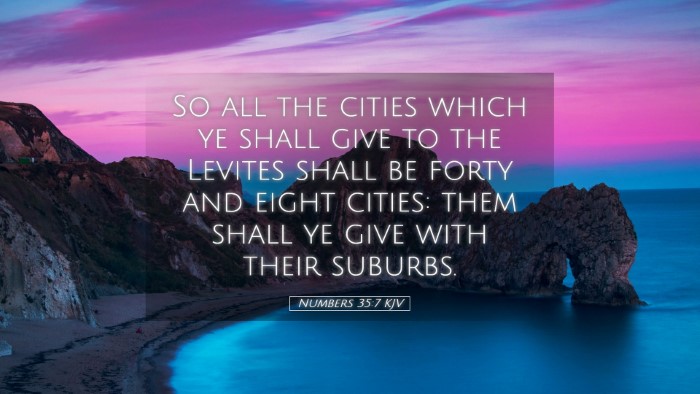Commentary on Numbers 35:7
Verse Analysis: Numbers 35:7 states, "So all the cities which ye shall give to the Levites shall be forty and eight cities: them shall ye give with their suburbs." This verse pertains to the allocation of cities to the Levites, the tribe set apart for the service of God in the Israelite community.
Historical Context
The Levites were one of the twelve tribes of Israel, distinguished by their role in religious practices and duties. Unlike other tribes, they were not allocated a specific territory but were given cities distributed throughout the inheritance of the other tribes, ensuring that the worship and service to God were accessible to all. This arrangement reflects God’s intention for the Levites to minister in various locations, maintaining the spiritual well-being of the nation.
Commentary Insights
Matthew Henry's Commentary
Matthew Henry emphasizes the importance of the Levites' cities as a means of providing for their spiritual leadership and service. He notes, "The Levites were dispersed among the people, not only to execute the functions of their office but also to ensure that among every tribe there were those who could teach the law and lead in worship." He suggests that these cities symbolize God's provision and the responsibility of the people to support their spiritual leaders.
Albert Barnes' Commentary
Albert Barnes provides additional insights, highlighting that the stipulation of 48 cities includes their surrounding suburbs. He writes, "The suburbs were intended to provide land for the Levites to cultivate and maintain their livelihoods while remaining dedicated to their religious duties." This indicates the balance between spiritual vocation and practical sustenance, affirming that God cares for the needs of His ministers.
Adam Clarke's Commentary
Adam Clarke discusses the significance of the cities granted to the Levites, reflecting on their role as spiritual guides within the community. He notes, "These cities serve not merely as residences but as centers of worship and education where the people could engage with the laws of God." Clarke points out that this allocation underscores God’s desire for His covenant people to have constant access to spiritual instruction and support.
Theological Implications
The distribution of cities to the Levites emphasizes several theological themes:
- God’s Provision: The cities assure that the Levites are cared for, affirming God’s care for those who serve Him.
- Community Responsibility: This arrangement fosters a sense of collective responsibility among the Israelites to support their spiritual leaders.
- Accessibility of Worship: By placing Levites amongst various tribes, the text highlights God's heart for accessible worship and teaching.
Pastoral Applications
For pastors and ministry leaders, Numbers 35:7 serves as a reminder of the importance of ensuring that their congregations support their spiritual leaders adequately. The Levites' cities illustrate a model of shared responsibility in ministry. Pastors are encouraged to:
- Establish structures that ensure support for their ministry teams and leaders.
- Engage the congregation in the spiritual formation of the community.
- Recognize the significance of accessibility in worship, ensuring that spiritual resources are readily available to all.
Conclusion
In conclusion, Numbers 35:7 encapsulates fundamental principles for community life and spiritual leadership within the framework of faith. Drawing from the insights of Matthew Henry, Albert Barnes, and Adam Clarke, it’s clear that these verses are not merely historical records but rich sources of theological and practical wisdom for today’s church. The allocation of 48 cities to the Levites illustrates God’s enduring provision and the continual relevance of communal support for spiritual leaders. As scholars, theologians, and practitioners engage with this text, it encourages reformulating our understanding of ministry in the communal context of faith.


